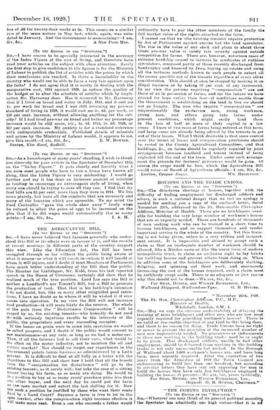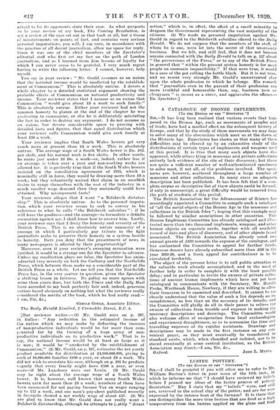"TITE COMING REVOLUTION."
(To THE EDITOR or THE " SPECTATOR "1 Sia,—Whatever one may think of its general political morality, the Spectator has admittedly one high virtue—that it is all afraid to let its opponents state their case. As what purports to be your review of my book, The Coming Revolution, is not a review of the case set out in that book at all, but a tissue of misstatements on points of fact, and contains very serious personal imputations, you will, I am sure, in accordance with the practice of n11 decent journalism, allow me space for reply. Since it was one of the chief members of the Spectator's editorial staff who first set my feet on the path of London journalism, and as I learned from Aim lessons of loyalty for which I can never cease to be grateful, I very much regret having to write the following letter. I cannot, however, help myself.
You say in your review: " Mr. Gould assumes as an axiom that the national income would be unaffected by the establish- ment of Communism." This is absolutely untrue. I devote a whole chapter to n detailed statistical argument showing the probable effects of Communism on national productivity and income. Your reviewer states that I assume as an axiom that Communism " would give about £8 a week to each family!' This is absolutely untrue. Either your reviewer had not the common honesty to glance at the end of the chapter he was professing to summarize, or else he is deliberately misstating the fact in order to destroy my argument. I do not assume as an axiom, but devote considerable space to proving with detailed facts and figures, that that equal distribution which your reviewer calls Communism would give each family at least £10 a week.
Your reviewer implies that South Wales hewers get very much more at present than £8 a week. This is absolutely untrue. The average wage of a South Wales hewer is 25s. ltd. per shift, and his normal week is five shifts. In other words, he earns just under £6 10s. a week—or, indeed, rather less if an average is taken ever a year and non-working weeks are allowed for. It is perfectly true that if the South Wales hewers insisted on the conciliation agreement of 1915, which is nominally still in force, they would be drawing more than £8 a week; but they voluntarily waived that claim in an unselfish desire to range themselves with the rest of the industry in a much smaller wage demand than they sectionally could have obtained. Why misrepresent facts?
Your reviewer alleges that I want "a Bolshevik dictator- ship." This is absolutely untrue. As to the personal imputa- tion which your reviewer seems to seek to convey in his reference to what he calls "the Bolshevik subsidies": if lie will have the goodness—and the courage—to formulate a definite accusation against me, I shall know how to answer him. Lastly, your reviewer says that I decry the honesty and veracity of the British Press. This is an absolutely unfair summary of a passage in which I particularly pay tribute to the fight journalists make to preserve their honesty in a system hostile to honesty. Dare you deny that the presentment of news in many newspapers is affected by their proprietorship?
Moreover, even if your reviewer's sweeping accusation were justified, it would be a strange one for the Spectator to advance. Unless my recollection plays me false, the Spectator has anim- adverted very severely on both the Cadbury and the Northcliffe Press, which between them make up a considerable part of the British Press as a whole. Let me tell you that the Northcliffe Press has, in the very matter in question, given the Spectator a striking lesson in fairness. Its policy no more agrees with mine than yours does, but both the Times and the Daily Mail have accorded to my book perfectly fair and, indeed, generous notices based obviously on nothing but what the reviewer really considered the merits of the book, which he had really read.— I am, Sir, &c..
[Our reviewer writes :—(1) Mr. Gould says on p. 207, in italics: "Any reduction in the estimated income of the nation which we may make by deducting the incomes of non-productive individuals would be far more than com- pensated for by the turning of a huge army of non- productive individuals on to productive work." That is to say, the national income would be at least as large as it is now; it would be " unaffected by the • establishment of Communism." (2) Mr. Gould, on p. 187, estimates the net yearly product available for distribution at £4,000,000,000, giving to each of 10,000,000 families £400 a year, or about £8 a week. We did not wish to overstate his case, although on p. 188 he predicts vaguely that every family might have £500 a year, or even more—if Mr. Lanabury were our Lenin. (3) Mr. Gould may be right about the average wage of a South Wales hewer. It is, however, well known that many South Wales hewers earn far more than £8 a week; numbers of them have been summoned for not paying Income Tax on wages ranging up to £12 a week, and one man's pay-sheet published recently in facsimile showed a net weekly wage of about £17. (4) We are glad to know that Mr. Gould does not really want a Bolshevik dictatorship, although he attempts to j-stify "direct action," which is, in effect, the effort of a small minority to dragoon the Government representing the vast majority of the citizens. (5) We made no personal imputation against Mr. Gould in regard to the Bolshevik subsidies offered to the Daily Herald. We do not suppose that the members of the staff, of whom ho is one, were let into the secret of that unsavoury business. But we felt, and still feel, that it does not become anyone connected with the Daily Herald to talk on p. 137 about "the perversions of the Press," or to say of the British Press in general that " within the present system honesty is for most people an economic impossibility." If that were true, it would bo a case of the pot calling the kettle black. But it is not trite, and we resent very strongly Mr. Gould's unwarranted slur upon the whole profession to which he belongs. His remark that " journalists even in the pursuit of their profession aro more truthful and honourable than, say, business men or clergymen " is meant as a sneer, and aggravates the offence.— ED. Spectator.]







































 Previous page
Previous page